Critique of Technology: David Strong's Philosophy on Modern Life
VerifiedAdded on 2023/05/30
|5
|1094
|152
Essay
AI Summary
This essay delves into David Strong's critique of technology in "Technological Subversion," questioning the modern valuation of technology and its impact on the "good life." Strong argues that while technology offers ease and comfort, it simultaneously alienates humans from nature and each other. The essay acknowledges the benefits of technology, such as advancements in medicine and communication, but also highlights Strong's concern that technology diminishes essential human skills and engagement. The essay further analyzes Strong's distinction between "things" and "devices," illustrating how devices provide instant solutions but lack the skill and engagement that give meaning to human experiences. Ultimately, the essay presents a balanced perspective on the complex relationship between technology and human existence.
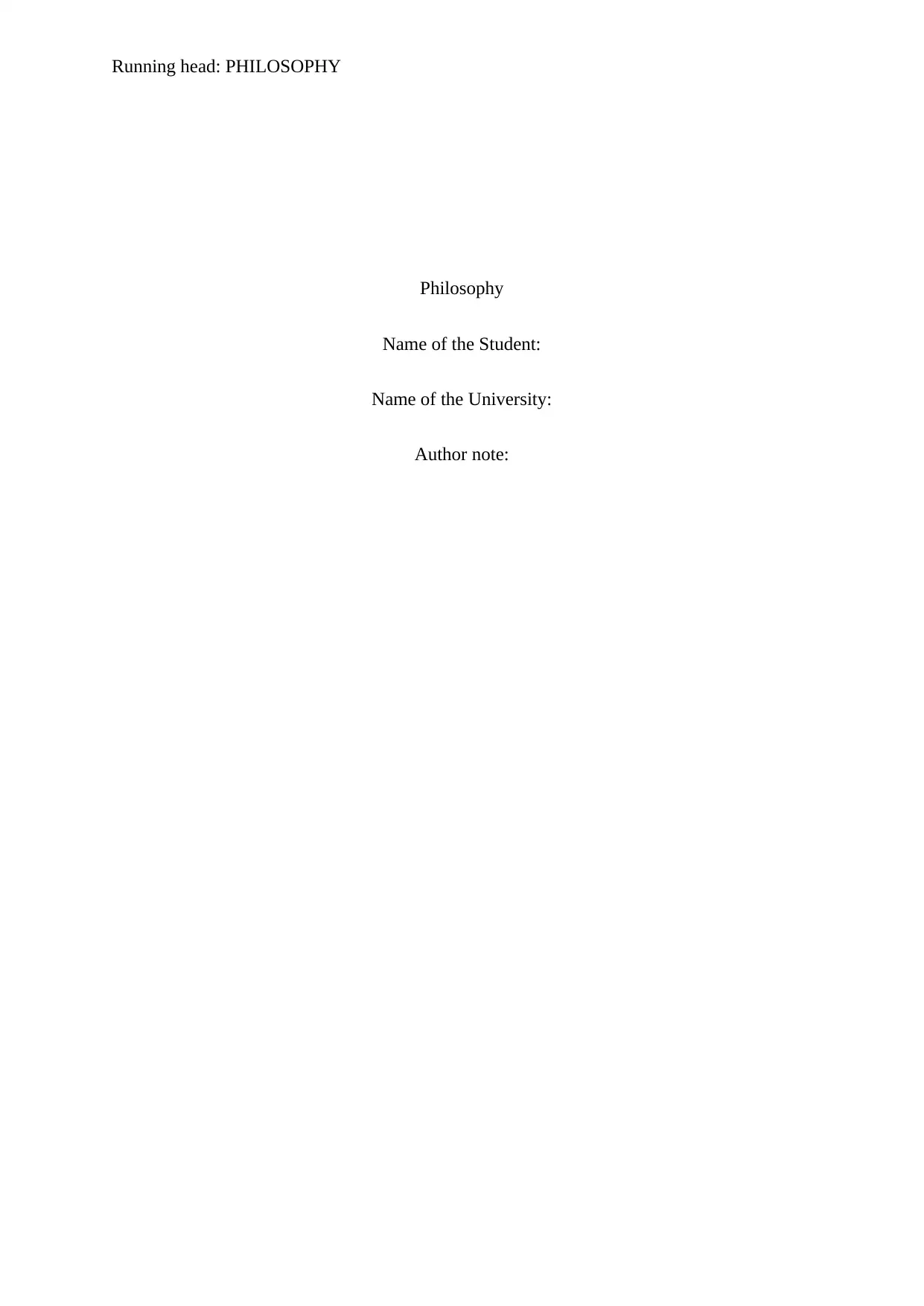
Running head: PHILOSOPHY
Philosophy
Name of the Student:
Name of the University:
Author note:
Philosophy
Name of the Student:
Name of the University:
Author note:
Paraphrase This Document
Need a fresh take? Get an instant paraphrase of this document with our AI Paraphraser
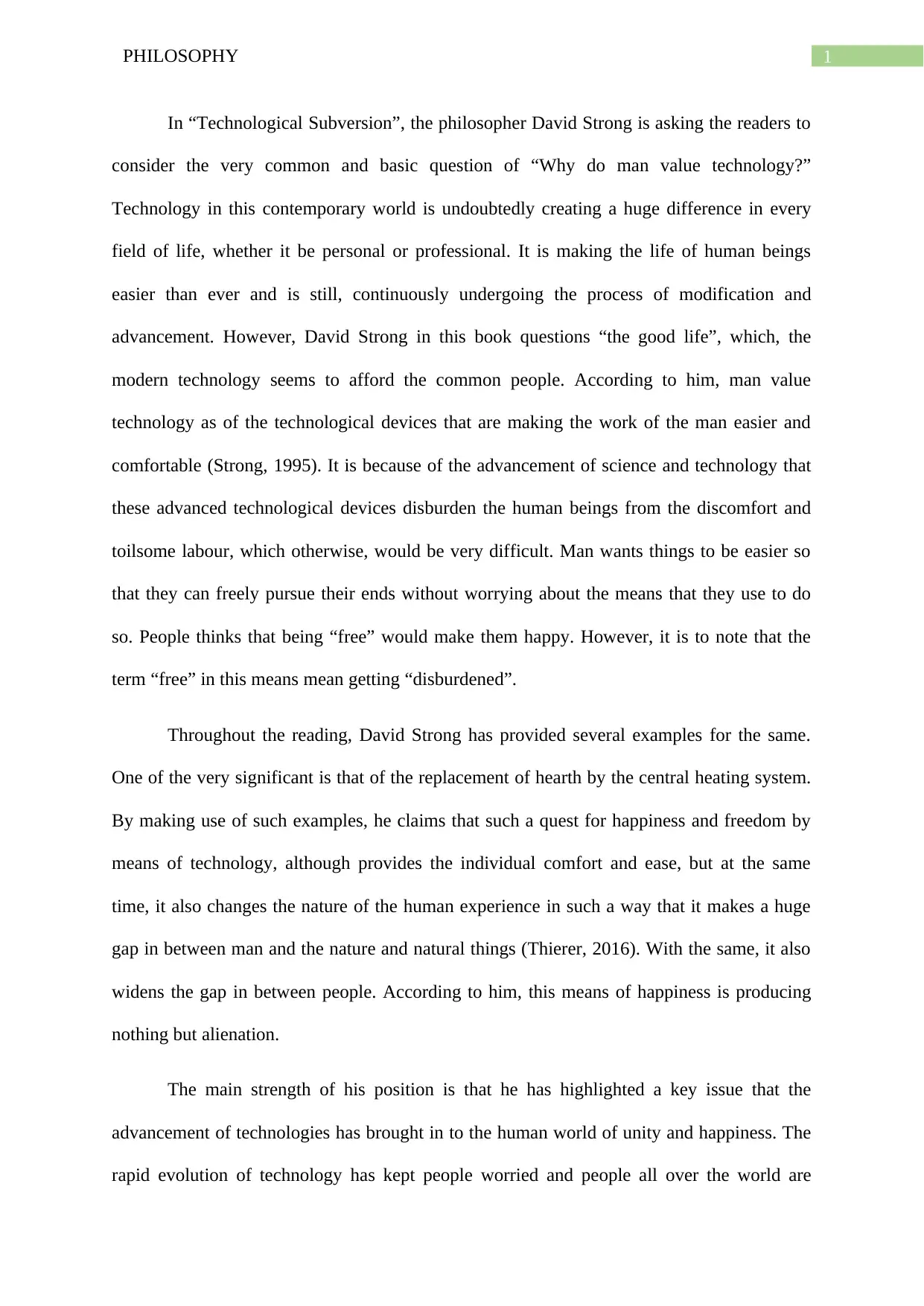
1PHILOSOPHY
In “Technological Subversion”, the philosopher David Strong is asking the readers to
consider the very common and basic question of “Why do man value technology?”
Technology in this contemporary world is undoubtedly creating a huge difference in every
field of life, whether it be personal or professional. It is making the life of human beings
easier than ever and is still, continuously undergoing the process of modification and
advancement. However, David Strong in this book questions “the good life”, which, the
modern technology seems to afford the common people. According to him, man value
technology as of the technological devices that are making the work of the man easier and
comfortable (Strong, 1995). It is because of the advancement of science and technology that
these advanced technological devices disburden the human beings from the discomfort and
toilsome labour, which otherwise, would be very difficult. Man wants things to be easier so
that they can freely pursue their ends without worrying about the means that they use to do
so. People thinks that being “free” would make them happy. However, it is to note that the
term “free” in this means mean getting “disburdened”.
Throughout the reading, David Strong has provided several examples for the same.
One of the very significant is that of the replacement of hearth by the central heating system.
By making use of such examples, he claims that such a quest for happiness and freedom by
means of technology, although provides the individual comfort and ease, but at the same
time, it also changes the nature of the human experience in such a way that it makes a huge
gap in between man and the nature and natural things (Thierer, 2016). With the same, it also
widens the gap in between people. According to him, this means of happiness is producing
nothing but alienation.
The main strength of his position is that he has highlighted a key issue that the
advancement of technologies has brought in to the human world of unity and happiness. The
rapid evolution of technology has kept people worried and people all over the world are
In “Technological Subversion”, the philosopher David Strong is asking the readers to
consider the very common and basic question of “Why do man value technology?”
Technology in this contemporary world is undoubtedly creating a huge difference in every
field of life, whether it be personal or professional. It is making the life of human beings
easier than ever and is still, continuously undergoing the process of modification and
advancement. However, David Strong in this book questions “the good life”, which, the
modern technology seems to afford the common people. According to him, man value
technology as of the technological devices that are making the work of the man easier and
comfortable (Strong, 1995). It is because of the advancement of science and technology that
these advanced technological devices disburden the human beings from the discomfort and
toilsome labour, which otherwise, would be very difficult. Man wants things to be easier so
that they can freely pursue their ends without worrying about the means that they use to do
so. People thinks that being “free” would make them happy. However, it is to note that the
term “free” in this means mean getting “disburdened”.
Throughout the reading, David Strong has provided several examples for the same.
One of the very significant is that of the replacement of hearth by the central heating system.
By making use of such examples, he claims that such a quest for happiness and freedom by
means of technology, although provides the individual comfort and ease, but at the same
time, it also changes the nature of the human experience in such a way that it makes a huge
gap in between man and the nature and natural things (Thierer, 2016). With the same, it also
widens the gap in between people. According to him, this means of happiness is producing
nothing but alienation.
The main strength of his position is that he has highlighted a key issue that the
advancement of technologies has brought in to the human world of unity and happiness. The
rapid evolution of technology has kept people worried and people all over the world are
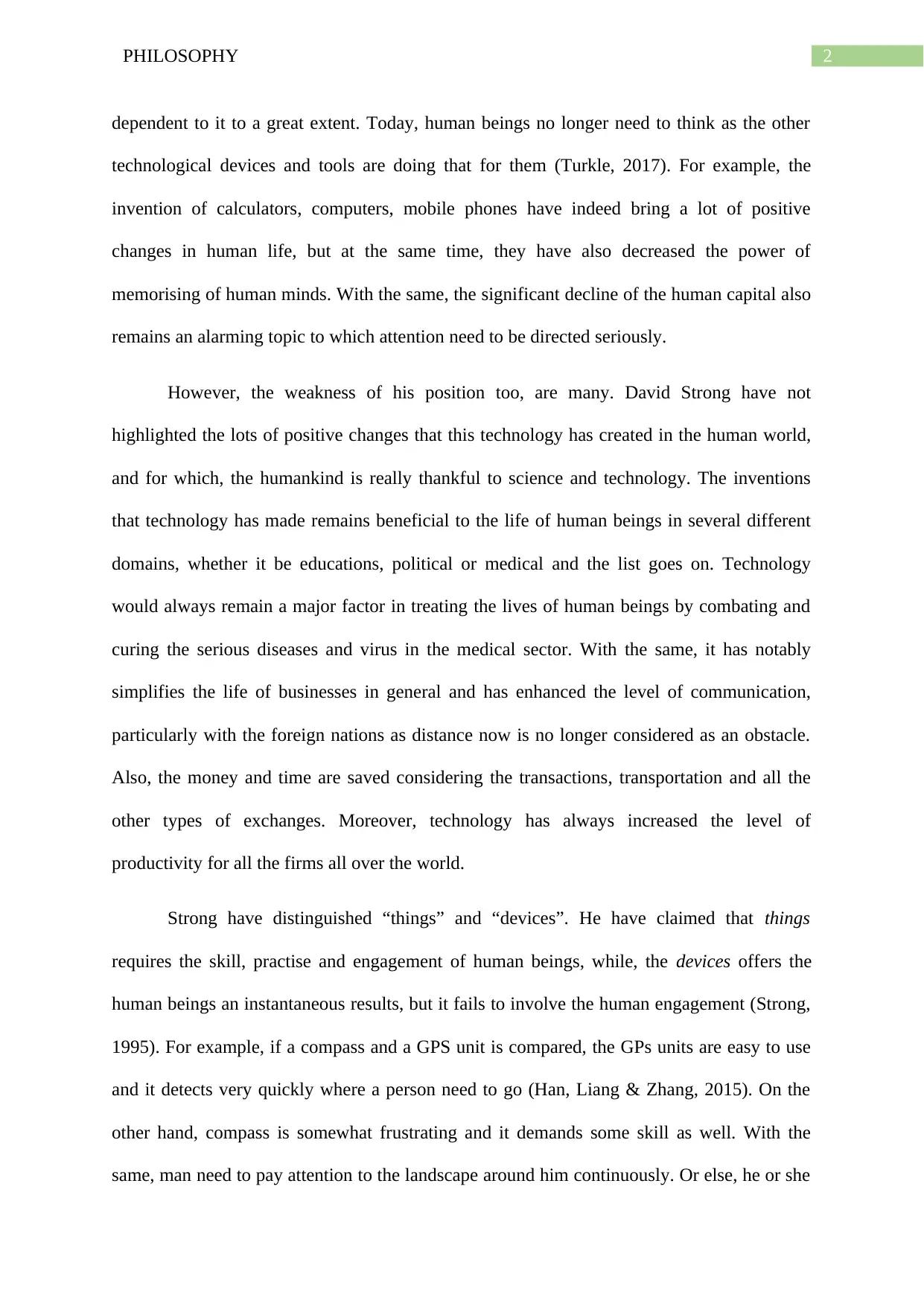
2PHILOSOPHY
dependent to it to a great extent. Today, human beings no longer need to think as the other
technological devices and tools are doing that for them (Turkle, 2017). For example, the
invention of calculators, computers, mobile phones have indeed bring a lot of positive
changes in human life, but at the same time, they have also decreased the power of
memorising of human minds. With the same, the significant decline of the human capital also
remains an alarming topic to which attention need to be directed seriously.
However, the weakness of his position too, are many. David Strong have not
highlighted the lots of positive changes that this technology has created in the human world,
and for which, the humankind is really thankful to science and technology. The inventions
that technology has made remains beneficial to the life of human beings in several different
domains, whether it be educations, political or medical and the list goes on. Technology
would always remain a major factor in treating the lives of human beings by combating and
curing the serious diseases and virus in the medical sector. With the same, it has notably
simplifies the life of businesses in general and has enhanced the level of communication,
particularly with the foreign nations as distance now is no longer considered as an obstacle.
Also, the money and time are saved considering the transactions, transportation and all the
other types of exchanges. Moreover, technology has always increased the level of
productivity for all the firms all over the world.
Strong have distinguished “things” and “devices”. He have claimed that things
requires the skill, practise and engagement of human beings, while, the devices offers the
human beings an instantaneous results, but it fails to involve the human engagement (Strong,
1995). For example, if a compass and a GPS unit is compared, the GPs units are easy to use
and it detects very quickly where a person need to go (Han, Liang & Zhang, 2015). On the
other hand, compass is somewhat frustrating and it demands some skill as well. With the
same, man need to pay attention to the landscape around him continuously. Or else, he or she
dependent to it to a great extent. Today, human beings no longer need to think as the other
technological devices and tools are doing that for them (Turkle, 2017). For example, the
invention of calculators, computers, mobile phones have indeed bring a lot of positive
changes in human life, but at the same time, they have also decreased the power of
memorising of human minds. With the same, the significant decline of the human capital also
remains an alarming topic to which attention need to be directed seriously.
However, the weakness of his position too, are many. David Strong have not
highlighted the lots of positive changes that this technology has created in the human world,
and for which, the humankind is really thankful to science and technology. The inventions
that technology has made remains beneficial to the life of human beings in several different
domains, whether it be educations, political or medical and the list goes on. Technology
would always remain a major factor in treating the lives of human beings by combating and
curing the serious diseases and virus in the medical sector. With the same, it has notably
simplifies the life of businesses in general and has enhanced the level of communication,
particularly with the foreign nations as distance now is no longer considered as an obstacle.
Also, the money and time are saved considering the transactions, transportation and all the
other types of exchanges. Moreover, technology has always increased the level of
productivity for all the firms all over the world.
Strong have distinguished “things” and “devices”. He have claimed that things
requires the skill, practise and engagement of human beings, while, the devices offers the
human beings an instantaneous results, but it fails to involve the human engagement (Strong,
1995). For example, if a compass and a GPS unit is compared, the GPs units are easy to use
and it detects very quickly where a person need to go (Han, Liang & Zhang, 2015). On the
other hand, compass is somewhat frustrating and it demands some skill as well. With the
same, man need to pay attention to the landscape around him continuously. Or else, he or she
⊘ This is a preview!⊘
Do you want full access?
Subscribe today to unlock all pages.

Trusted by 1+ million students worldwide
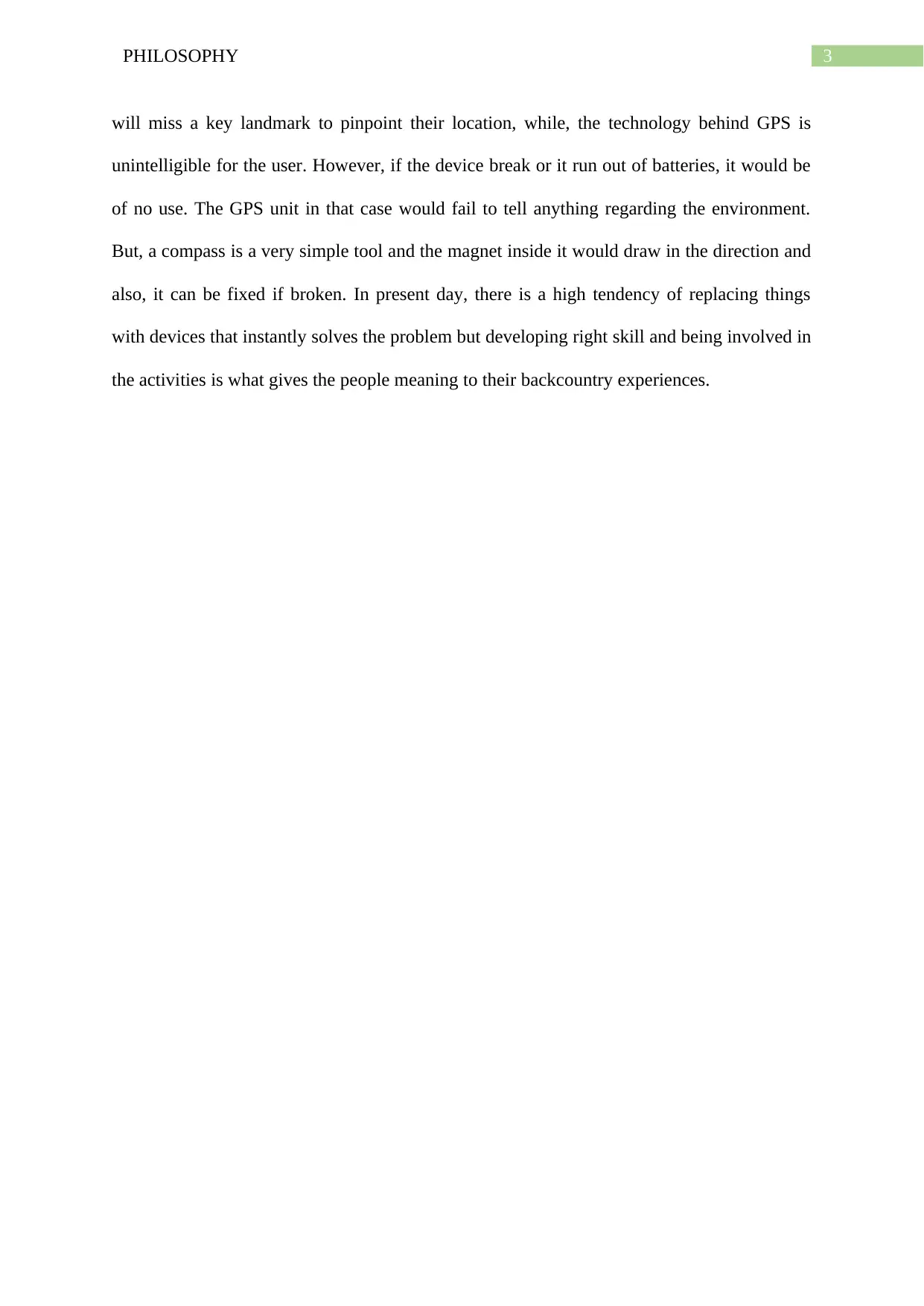
3PHILOSOPHY
will miss a key landmark to pinpoint their location, while, the technology behind GPS is
unintelligible for the user. However, if the device break or it run out of batteries, it would be
of no use. The GPS unit in that case would fail to tell anything regarding the environment.
But, a compass is a very simple tool and the magnet inside it would draw in the direction and
also, it can be fixed if broken. In present day, there is a high tendency of replacing things
with devices that instantly solves the problem but developing right skill and being involved in
the activities is what gives the people meaning to their backcountry experiences.
will miss a key landmark to pinpoint their location, while, the technology behind GPS is
unintelligible for the user. However, if the device break or it run out of batteries, it would be
of no use. The GPS unit in that case would fail to tell anything regarding the environment.
But, a compass is a very simple tool and the magnet inside it would draw in the direction and
also, it can be fixed if broken. In present day, there is a high tendency of replacing things
with devices that instantly solves the problem but developing right skill and being involved in
the activities is what gives the people meaning to their backcountry experiences.
Paraphrase This Document
Need a fresh take? Get an instant paraphrase of this document with our AI Paraphraser
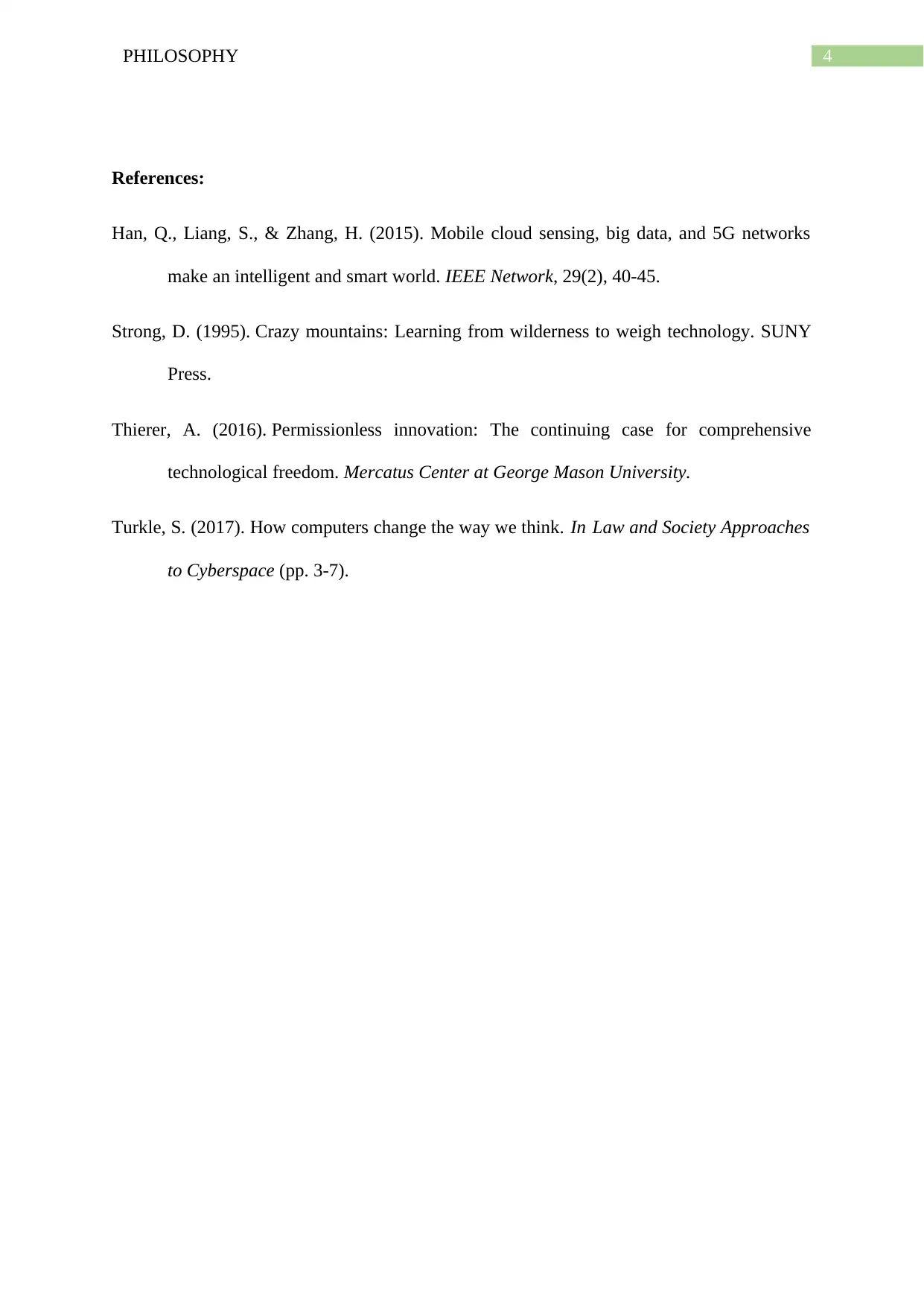
4PHILOSOPHY
References:
Han, Q., Liang, S., & Zhang, H. (2015). Mobile cloud sensing, big data, and 5G networks
make an intelligent and smart world. IEEE Network, 29(2), 40-45.
Strong, D. (1995). Crazy mountains: Learning from wilderness to weigh technology. SUNY
Press.
Thierer, A. (2016). Permissionless innovation: The continuing case for comprehensive
technological freedom. Mercatus Center at George Mason University.
Turkle, S. (2017). How computers change the way we think. In Law and Society Approaches
to Cyberspace (pp. 3-7).
References:
Han, Q., Liang, S., & Zhang, H. (2015). Mobile cloud sensing, big data, and 5G networks
make an intelligent and smart world. IEEE Network, 29(2), 40-45.
Strong, D. (1995). Crazy mountains: Learning from wilderness to weigh technology. SUNY
Press.
Thierer, A. (2016). Permissionless innovation: The continuing case for comprehensive
technological freedom. Mercatus Center at George Mason University.
Turkle, S. (2017). How computers change the way we think. In Law and Society Approaches
to Cyberspace (pp. 3-7).
1 out of 5
Related Documents
Your All-in-One AI-Powered Toolkit for Academic Success.
+13062052269
info@desklib.com
Available 24*7 on WhatsApp / Email
![[object Object]](/_next/static/media/star-bottom.7253800d.svg)
Unlock your academic potential
Copyright © 2020–2026 A2Z Services. All Rights Reserved. Developed and managed by ZUCOL.





